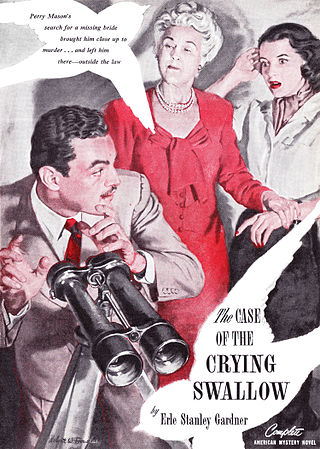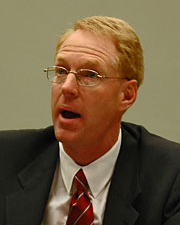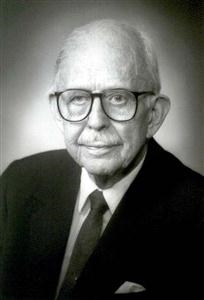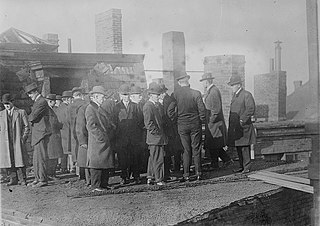
The Racketeer Influenced and Corrupt Organizations (RICO) Act is a United States federal law that provides for extended criminal penalties and a civil cause of action for acts performed as part of an ongoing criminal organization.

Perry Mason is a fictional character, an American criminal defense lawyer who is the main character in works of detective fiction written by Erle Stanley Gardner. Perry Mason features in 82 novels and 4 short stories, all of which involve a client being charged with murder, usually involving a preliminary hearing or jury trial. Typically, Mason establishes his client's innocence by finding the real murderer. The character was inspired by famed Los Angeles criminal defense attorney Earl Rogers.

In the United States, a district attorney (DA), county attorney, state's attorney, prosecuting attorney, commonwealth's attorney, state attorney or solicitor is the chief prosecutor and/or chief law enforcement officer representing a U.S. state in a local government area, typically a county or a group of counties. The exact name and scope of the office varies by state. Alternative titles for the office include county attorney, solicitor, or county prosecutor. Generally the prosecutor represents the people of the jurisdiction and in many states their authority stems from the state constitution. Unlike similar roles in other common law judicial systems, these are appointed through partisan political processes, and their holders usually have an allegiance to a political party or faction, rather than being held by a career civil servant appointed on merit in an independent process.

A prosecutor is a legal representative of the prosecution in states with either the common law adversarial system or the civil law inquisitorial system. The prosecution is the legal party responsible for presenting the case in a criminal trial against an individual accused of breaking the law. Typically, the prosecutor represents the state or the government in the case brought against the accused person.
Nolle prosequi, abbreviated nol or nolle pros, is legal Latin meaning "to be unwilling to pursue". It is a type of prosecutorial discretion in common law, used for prosecutors' declarations that they are voluntarily ending a criminal case before trial or before a verdict is rendered; it is a kind of motion to dismiss and contrasts with an involuntary dismissal.

Dee Vance Benson was a Senior United States district judge and chief judge of the United States District Court for the District of Utah. He was briefly a professional soccer player. He was nominated as judge by President George H. W. Bush on May 16, 1991, and confirmed by the United States Senate on September 12, 1991, receiving his commission on September 16, 1991. In May 2004, Chief Justice William Rehnquist appointed Judge Benson to the Foreign Intelligence Surveillance Court for a seven-year term.

Richard Warren Roberts is an inactive Senior United States district judge of the United States District Court for the District of Columbia.
The Double Jeopardy Clause of the Fifth Amendment to the United States Constitution provides: "[N]or shall any person be subject for the same offence to be twice put in jeopardy of life or limb..." The four essential protections included are prohibitions against, for the same offense:

Dale Albert Kimball is a senior United States district judge of the United States District Court for the District of Utah.
Weldon Angelos is a music producer who was sentenced in a high profile marijuana case involving mandatory minimum sentences that was presented to the United States Supreme Court. The United States Supreme Court declined to hear the case but Angelos was later released from prison 13 years later due to public pressure from celebrities, United States Senators, the judge that sentenced him, and ultimately the prosecutor who prosecuted him.

Stephen Hale Anderson is an inactive Senior United States circuit judge of the United States Court of Appeals for the Tenth Circuit.

Paul George Cassell is a former United States district judge of the United States District Court for the District of Utah, who is currently the Ronald N. Boyce Presidential Professor of Criminal Law and University Distinguished Professor of Law at the S.J. Quinney College of Law at the University of Utah. He is best known as an expert in, and proponent of, victims' rights.

Albert Sherman Christensen was a trial attorney, author, and a United States district judge of the United States District Court for the District of Utah. Christensen was the first member of the Church of Jesus Christ of Latter-day Saints to be appointed in Utah. He authored six books, volumes of poetry, and many legal articles. One of Christensen's most significant contributions to the legal community was his establishment of the United States' first American Inn of Court in 1980.

Kevin Thomas Duffy was an American lawyer and United States district judge of the United States District Court for the Southern District of New York.

Brown v. Buhman, No. 14-4117, is a legal case in the United States federal courts challenging the State of Utah's criminal polygamy law. The action was filed in 2011 by polygamous patriarch Kody Brown along with his wives Meri Brown, Janelle Brown, Christine Brown, and Robyn Sullivan. The Brown family belongs to the Apostolic United Brethren faith. They are best known for the reality television series featuring them, Sister Wives.
Brooke C. Wells is a federal magistrate judge for the United States District Court for the District of Utah. She was appointed to this position on June 4, 2003.
Michele Mladejovsky Christiansen Forster is an American lawyer and judge. Forster is a judge of the Utah Court of Appeals.

Grand juries in the United States are groups of citizens empowered by United States federal or state law to conduct legal proceedings, chiefly investigating potential criminal conduct and determining whether criminal charges should be brought. The grand jury originated under the law of England and spread through colonization to other jurisdictions as part of the common law. Today, however, the United States is one of only two jurisdictions, along with Liberia, that continues to use the grand jury to screen criminal indictments.

John William Vaudreuil is an American lawyer. He was United States Attorney for the Western District of Wisconsin during the presidency of Barack Obama.
Cone v. Bell, 556 U.S. 449 (2009), was a case in which the United States Supreme Court held that a defendant was entitled to a hearing to determine whether prosecutors in his 1982 death penalty trial violated his right to due process by withholding exculpatory evidence. The defendant, Gary Cone, filed a petition for postconviction relief from a 1982 death sentence in which he argued that prosecutors violated his rights to due process under the Fourteenth Amendment by withholding police reports and witness statements that potentially could have shown that his drug addiction affected his behavior. In an opinion written by Justice John Paul Stevens, the Supreme Court held that Cone was entitled to a hearing to determine whether the prosecution's failure to disclose exculpatory evidence violated Cone's right to due process; the Court noted that "the quantity and the quality of the suppressed evidence lends support to Cone’s position at trial that he habitually used excessive amounts of drugs, that his addiction affected his behavior during his crime spree". In 2016, Gary Cone died from natural causes while still sitting on Tennessee's death row.














